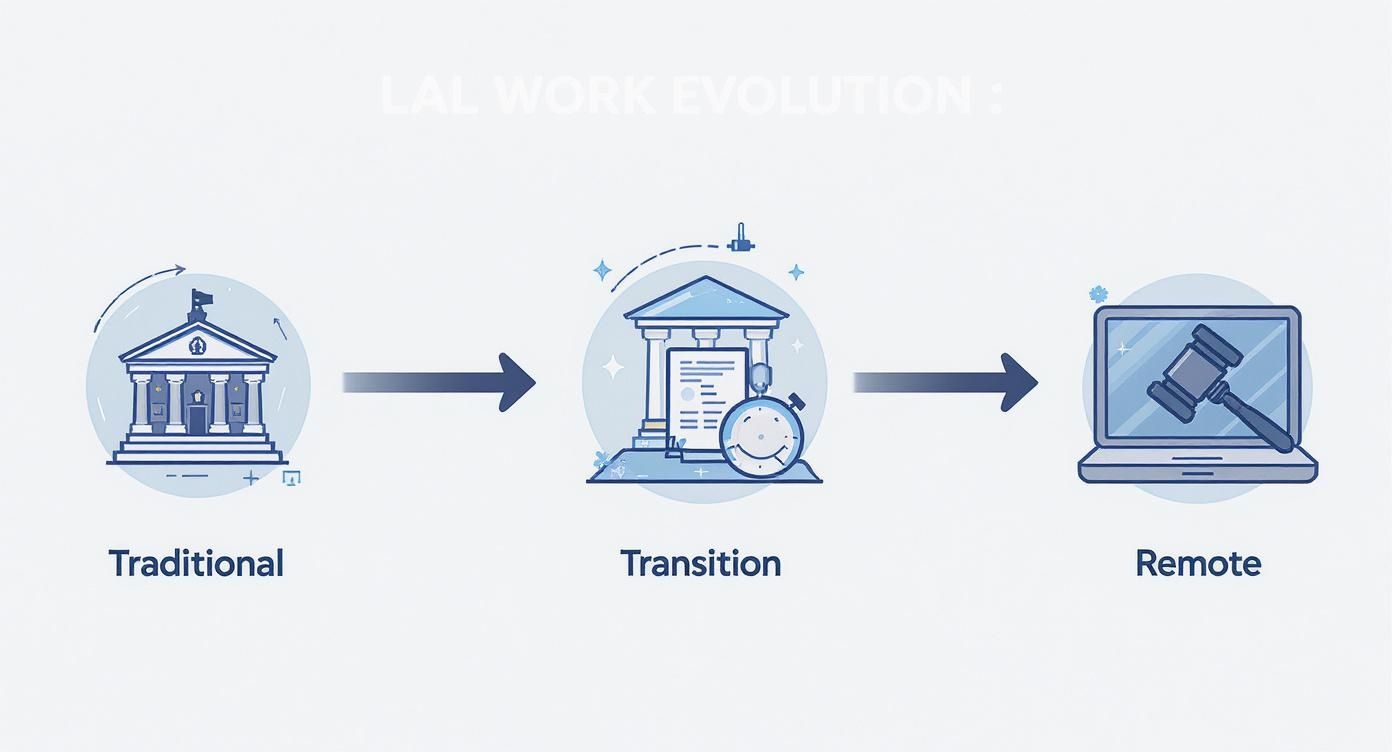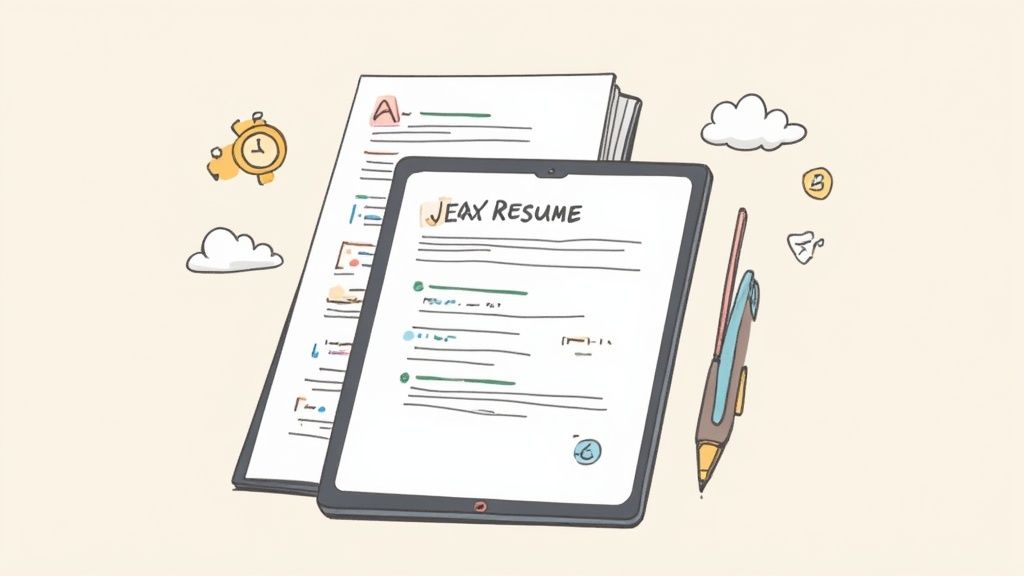
 15 minutes read
15 minutes read
Let's cut to the chase. Yes, you can find legitimate part-time remote legal jobs that give you flexibility and interesting work. These roles aren't some mythical unicorn anymore. The legal world may have been dragged kicking and screaming into the 21st century, but the result is a surprising boom in flexible opportunities for sharp legal pros.
And I’m not talking about mind-numbing doc review gigs that pay pennies.
For years, the idea of a part-time legal gig from home felt like a pipe dream. I remember it well. The default was a stuffy office, a soul-crushing commute, and the relentless tyranny of the billable hour. Many of us have been there, trading our lives for a partnership track that demanded everything but our firstborn child.
But the ground has genuinely shifted. This isn't just a pandemic hangover; it's a real, structural change in how law firms and in-house teams operate. They’ve finally woken up to the fact that chaining a brilliant legal mind to a desk from 9-to-5 isn't the only way to get results.
It really boils down to two things: cold, hard economics and a long-overdue reality check. Firms are dealing with massive burnout and fighting to keep top lawyers who are demanding a life. At the same time, startups need top-tier legal advice but can't stomach a full-time, six-figure GC. This created the perfect storm for part-time remote legal work to flourish.
The numbers don't lie. A recent report showed that a staggering 87% of law firms now allow remote work, and many are actively offering part-time schedules to keep their best people. This is a complete 180 from the industry's old-school skepticism. If you want to dive deeper, you can discover more insights on legal trends and see the data for yourself.
This infographic captures the evolution from the old, rigid model to the flexible structures we’re seeing today.

The biggest takeaway? This isn't a temporary trend. It's the new normal.
This evolution has opened the door to a whole new world of roles that were basically science fiction a decade ago. It's time to think beyond the usual job titles. These new part-time arrangements come in several flavors, each suited for different career goals and lifestyles.
Here’s a quick-and-dirty breakdown of the roles you’ll actually find out there.
| Role Type | Best For | Typical Compensation Model |
|---|---|---|
| Fractional General Counsel | Experienced in-house attorneys who want to advise multiple startups without the equity drama. | Monthly Retainer or Flat Fee |
| Specialized Project Counsel | Lawyers with deep expertise in a niche (e.g., M&A, data privacy) for high-impact, short-term work. | Hourly Rate or Project-Based Fee |
| On-Demand Contract Support | Attorneys who actually enjoy redlining SaaS agreements and vendor contracts. | Per-Contract Fee or Hourly Rate |
| Overflow Litigation Support | Litigators helping swamped firms with discovery, motions, or research. All the fun, none of the office politics. | Hourly Rate |
| Legal Content & Writing | Attorneys with a knack for writing who create articles, white papers, or CLE materials. | Per-Project or Per-Word Rate |
As you can see, the opportunities are diverse. Whether you're a seasoned corporate lawyer or a litigator who wants to see their kids, there's a role that fits.

The game is no longer about finding a job; it's about designing a legal career that doesn't make you miserable. These remote roles are the building blocks.
Let’s get one thing straight. If your entire job search strategy is hitting "refresh" on the big, generic job boards, you’re missing the party. The best part-time remote legal jobs—the ones with interesting work and sane clients—are rarely blasted across Indeed. You need a better map.
Forget shotgunning your resume into the digital void. That’s a fast track to burnout and an inbox full of automated rejection emails. You need a targeted, almost sniper-like approach, focusing on the channels where the real opportunities live.
The big boards are like shouting in a stadium; niche platforms are like having a quiet conversation with the right person. They attract serious employers who know exactly what they’re looking for and are willing to pay for it.
Okay, let’s talk about the dreaded "N" word: networking. Most people do it wrong. It’s not about awkwardly sliding into DMs asking for a job. It's about being a valuable, visible resource before you need anything.
The goal is to become the first person someone thinks of when a specific legal need pops up. You do this by being genuinely helpful. Post insightful comments on LinkedIn about a recent court ruling. Share a helpful resource in a legal tech group. Don't be an empty suit.
A quick search on LinkedIn for "part time remote counsel" often reveals roles posted by founders themselves, not HR. This direct line to decision-makers is where you can bypass the application black hole entirely.

Your network isn't a list of contacts; it's a living source of unlisted opportunities. Treat it like a garden, not a vending machine you only visit when you're hungry.
For a deeper dive into specific remote roles available right now, check out our guide on remote law jobs. It’s a great next step. The perfect part-time remote legal job is out there, but you have to know which rocks to look under.
Let’s be brutally honest. Your traditional legal resume is probably sabotaging your search for part-time remote legal jobs. It’s a relic, built to impress a partner down the hall, not a hiring manager a thousand miles away. It screams, "I need an office, a paralegal, and constant supervision."
We have to fix that. Now.
Your old resume is likely a laundry list of tasks: "drafted motions," "conducted discovery." For a remote role, that tells a hiring manager nothing about your ability to work without someone breathing down your neck. They're not just hiring your legal brain; they're hiring your discipline and your self-management skills.

The single biggest shift you need to make is framing your experience around autonomy and results. The hiring manager's biggest fear is hiring someone who goes dark and misses deadlines. Your resume needs to crush that fear on sight.
See the difference? One says you did a job. The other says you can be trusted to run a project from your kitchen table. For a deeper understanding, it’s worth exploring skills-based hiring, which prioritizes what you can actually do.
You don’t need to be a coding genius, but you must signal you’re comfortable with modern legal tech. Listing "Proficient in Microsoft Word" is like bragging you know how to use a fork. It’s expected.
Go deeper. Mention specific platforms you've used for e-discovery (Relativity), contract management (Ironclad), or virtual depositions (vTestify). A recent Federal Bar Association report found that 54% of legal professionals use AI to draft correspondence. Highlighting this experience shows you're ready for an efficient, modern workflow.

The goal isn’t to list every piece of software you’ve ever touched. It’s to prove you can get up to speed on a new tech stack without a week of hand-holding. That’s the real value.
Alright, let's talk about the video interview. This is where a fantastic candidate on paper can completely fall apart. I’ve seen it all—bad lighting that makes you look like you're in witness protection, awkward silences, sounding like a robot. It's a minefield.
This is your shot to prove you’re not just a great lawyer, but a competent remote professional.
Forget the stuffy, in-person interview in a mahogany-trimmed conference room. The game is different. They aren't just testing your legal acumen; they're stress-testing your ability to build rapport through a screen.

First, the basics. And no, you don't need to mortgage your house for a Hollywood studio. But you do need to get a few things right, because a sloppy setup screams "I'm not serious about this."
Now for the main event. Remote interviews have a special category of questions designed to probe your autonomy. They are carefully calibrated tests.

When an interviewer asks, "How do you handle urgent tasks when your team is offline?" what they're really asking is, "Can I trust you to solve problems, or are you going to ping me at 10 PM because you're stuck?"
Your answers need to be specific and story-driven. Don't just say, "I'm a proactive communicator." Give them an example of a time you managed a project across time zones, documented your progress, and delivered without needing constant supervision.
And if you're looking for more prep, reviewing common legal assistant interview questions can help you sharpen answers on core competencies.
Finally, after the interview, don't drop the ball. Learning how to write a compelling thank you email can separate you from the other candidates. It reinforces your professionalism and shows you’re serious.
So, you’ve got the offer. Fantastic. Before you pop the champagne, take a breath. For part-time remote work, the negotiation isn't just about the hourly rate—it's about designing the role to fit your life.
This is your single best opportunity to set boundaries. If you don't, you risk signing up for a full-time job with part-time pay. We’ve all seen it: a role for “around 20 hours a week” slowly morphs into 35 hours, complete with late-night emails. This negotiation is your chance to prevent that soul-crushing scope creep.
First, let's nail down “flexible schedule.” It’s a wonderfully ambiguous term that can mean anything from “log on whenever” to “be on call 24/7.” Your job is to get brutally specific.
Don't just nod along; come to the table with your own definition.
This isn’t about being difficult; it’s about being a professional. You’re setting the rules of engagement.

The goal isn't just to land the job; it's to create a sustainable role that respects your time. The best part-time roles are built on crystal-clear expectations, not hopeful assumptions.
Alright, let's get to the numbers. The hourly rate is important, but it's just one piece of the puzzle. A great rate feels lousy if your hours are unpredictable or you're paying for essential software out of pocket.
Don't forget the leverage you hold. A survey from Remote Attorneys found that a staggering 44% of younger lawyers would quit if forced back to the office. Skilled remote candidates are in high demand. Learn more about how lawyer preferences are shaping the industry and walk into your negotiation with that confidence.
A few other items for your checklist:
Alright, let's get real. If you're seriously considering this path, you’ve probably got a few nagging questions and a healthy dose of skepticism. Good. That means you're thinking like a lawyer. Let's tackle the "what-ifs" that come up when you’re hunting for part-time remote legal jobs.
This is the big one. The fear is you'll be seen as less committed or just a temporary fix. The key is to stop thinking like an employee and start acting like a high-value consultant.
Your worth isn't tied to the hours you're logged in; it's measured by the problems you solve. Be fanatical about proactive communication. A crisp weekly email outlining what you accomplished and what's next is far more impactful than someone keeping their Slack dot green for eight hours.
Make your 15-20 hours a week so productive they feel more valuable than someone else's 40.
Of course they are. But frankly, this is a solved problem. Any modern firm worth its salt already has secure systems and VPNs. This isn't their first rodeo.
Your job is to show them you take security as seriously as they do. Bring it up proactively in the interview. Talk about your secure home office setup and your experience handling sensitive documents remotely. This signals you understand the immense responsibility of protecting client data.

The real concern isn't your Wi-Fi password. It's a test of your professionalism. Nail that, and the confidentiality issue vanishes.
That’s a definite risk if you don't position yourself correctly. If you market yourself as a generalist available for "whatever," you're going to get the doc review overflow nobody else wants. Simple as that.
But if you present yourself as a specialist who solves a very specific, high-value problem, you’ll get the interesting work.
The more defined your niche, the better the work. You become the go-to expert for that specific thing, and they'll bring you their most important projects in that area, regardless of how many hours you work.
Absolutely, but you have to redefine "career path." It’s not the traditional ladder to partnership. Think of it more like building a portfolio.
You might land one great part-time role as an anchor, then add a second firm or a few direct clients a year later. You're not just finding a job; you're building a practice on your own terms.
This path offers a different, more resilient kind of stability—one that comes from having a diverse client base instead of relying on a single employer. It’s not the old-school way, but for many of us, that’s the whole point.